15 Foods That May Help Beat Anxiety
Feeling anxious and wired? More and more people are suffering the symptoms of anxiety these days, and partly due to the demands of modern technology. We all seem to be connected to some sort of device more or less all the time nowadays, even when we should be resting or taking care of personal affairs. The simplest treatment for this, of course, is to take a complete break from technology — just disconnect from Facebook (sorry if that thought brought on a mild panic attack!), in fact turn off the damn computer, disconnect the phone … in effect make yourself invisible to the rest of the cyber world.
But who can afford to do that for very long? We all depend so much on our mobile phones and our PCs and email and our various social media. Not to mention our work; most of us use computers at work and many take that work home with them too.
Incidentally, if you’ve been experiencing anxiety for six months or longer then you may have a generalised anxiety disorder, as it’s known (GAD). The symptoms of GAD can be both physical and psychological and they can include such things as:
- tension (for no apparent reason)
- inability to concentrate
- fear (again, for no obvious reason)
- palpitations
- sleep disturbances
- irritability
- seemingly groundless worry
- chest tightness
- anxiety attacks
- panic attacks (more pronounced than anxiety attacks)
If you really can’t take a break from technology, then the best route to take is to make some changes to your diet to introduce something more suitable, since many of the widely available foods of today might well be exacerbating the situation. And it doesn’t have to be a shocking experience — many of the changes will re-introduce you to some delicious foods you might have virtually forgotten about.
Here’s a list of 15 foods (food groups, mostly) that are known to contain ingredients that will help ease your anxiety.
1 – Eggs
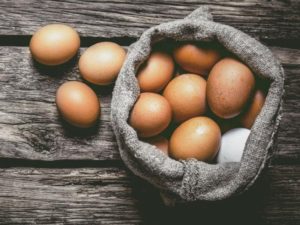 Eggs contain choline, an essential nutrient that is naturally present in various foods and is a source of methyl groups needed for many steps in metabolism.
Eggs contain choline, an essential nutrient that is naturally present in various foods and is a source of methyl groups needed for many steps in metabolism.
One study showed that those with the highest anxiety levels also had the lowest choline levels. Coincidence? I think not! Eggs are also a source of vitamin D, which is known to help ease anxiety and depression.
2 – Yogurt
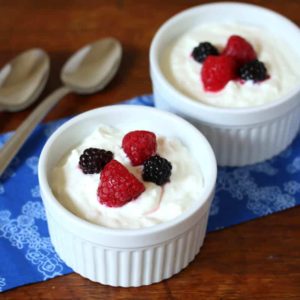 Yogurt is a fermented food that contains probiotics (healthful bacteria). A recent study indicated that these bacteria and fermented foods in general have positive effects on the brain. Studies have shown that probiotic foods tend to promote mental health by inhibiting free radicals and neurotoxins, which are known to damage neurons and can lead to anxiety.
Yogurt is a fermented food that contains probiotics (healthful bacteria). A recent study indicated that these bacteria and fermented foods in general have positive effects on the brain. Studies have shown that probiotic foods tend to promote mental health by inhibiting free radicals and neurotoxins, which are known to damage neurons and can lead to anxiety.
Further, a recent clinical review suggested that yogurt and other dairy products may also produce an anti-inflammatory effect in the body (and according to some research inflammation might be among the causes of depression, stress and anxiety).
3 – Spinach, chard, asparagus, kale
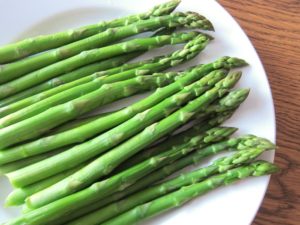 Studies going as far back as the 1960s indicate that many of those suffering from anxiety are deficient in folic acid (vitamin B9). Asparagus is a major source of folic acid and a single cup of it can provide about two-thirds of the daily requirement.
Studies going as far back as the 1960s indicate that many of those suffering from anxiety are deficient in folic acid (vitamin B9). Asparagus is a major source of folic acid and a single cup of it can provide about two-thirds of the daily requirement.
Research at the State University of New York found that anxiety symptoms are linked with a lower antioxidant state. Dark, leafy greens like kale are beneficial in boosting antioxidant levels and improving brain functioning.
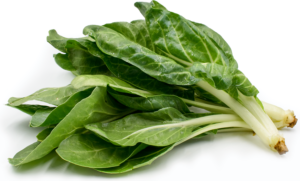 Chard has a high magnesium content, which can modulate the release of hormones linked to stress, e.g. cortisol. Magnesium deficiency has been indicated in increased anxiety and can upset the delicate balance of probiotics in the gut. Other good sources of magnesium are pumpkin, peanuts, seaweed and soya beans.
Chard has a high magnesium content, which can modulate the release of hormones linked to stress, e.g. cortisol. Magnesium deficiency has been indicated in increased anxiety and can upset the delicate balance of probiotics in the gut. Other good sources of magnesium are pumpkin, peanuts, seaweed and soya beans.
4 – Sweet potatoes
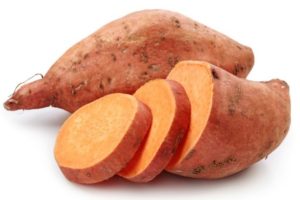 Sweet potatoes are another food that’s beneficial in curbing anxiety. They’re complex carbs that are rich in fibre and help to keep blood sugar levels steady, thereby balancing the mood.
Sweet potatoes are another food that’s beneficial in curbing anxiety. They’re complex carbs that are rich in fibre and help to keep blood sugar levels steady, thereby balancing the mood.
Other high fibre, low GI foods include Brussels sprouts, blackberries, raspberries, beans and squash.
5 – Dark chocolate
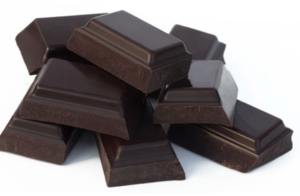 Don’t be shy to add a little dark chocolate to your diet (go on, it can be your guilty little secret!). Dark chocolate contains flavonols, which are a specific kind of antioxidant that is thought to aid brain function. They manage it by improving blood flow to the brain and giving it the resources it needs to adapt to stressful situations.
Don’t be shy to add a little dark chocolate to your diet (go on, it can be your guilty little secret!). Dark chocolate contains flavonols, which are a specific kind of antioxidant that is thought to aid brain function. They manage it by improving blood flow to the brain and giving it the resources it needs to adapt to stressful situations.
Some of those who have looked into the subject say that its effect is psychological and probably due to the taste, but you know what, who cares, as long as it works!
In one study, those who had dark chocolate twice a day for two weeks showed reduced levels of stress hormones, e.g. cortisol and catecholamines. Proof enough for me!
6 – Green tea
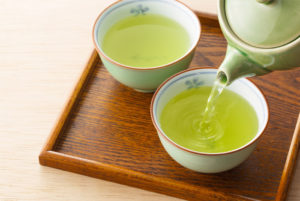 Green tea contains the amino acid L-theanine, which has shown positive results in tests. The research aimed to see what effect it might have in terms of easing anxiety.
Green tea contains the amino acid L-theanine, which has shown positive results in tests. The research aimed to see what effect it might have in terms of easing anxiety.
One study found that the subjects who drank a beverage containing L-theanine had reduced levels of cortisol (often linked with anxiety). It is thought that this effect might be due to L-theanine’s ability to curb nerves’ tendency to become overexcited.
Additionally, green tea contains EGCG (epigallocatechin gallate), an antioxidant that is believed to promote brain health.
7 – Kidney Beans
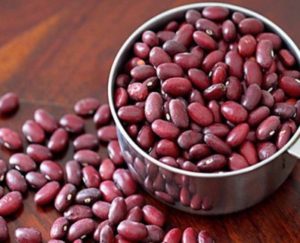 Like turkey and other poultry, kidney beans are high in tryptophan, an amino acid that’s known to boost serotonin production.
Like turkey and other poultry, kidney beans are high in tryptophan, an amino acid that’s known to boost serotonin production.
Serotonin has a calming effect on the nerves. Soya beans, cheese and pumpkin seeds are also good sources of tryptophan.
8 – Herbal teas
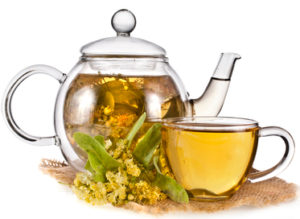 Chamomile contains chemicals that are known to reduce stress. People who took it over an eight-week period reported a significant decrease in anxiety. Lemon balm and skullcap contain GABA, a chemical neurotransmitter that is known to have a calming effect. And passionflower turned out to be at least as good at relieving anxiety as oxazepam, a benzodiazepine.
Chamomile contains chemicals that are known to reduce stress. People who took it over an eight-week period reported a significant decrease in anxiety. Lemon balm and skullcap contain GABA, a chemical neurotransmitter that is known to have a calming effect. And passionflower turned out to be at least as good at relieving anxiety as oxazepam, a benzodiazepine.
If you find tea or coffee worsening your moods, herbal teas could be just the substitute you’re looking for.
9 – Pumpkin seeds, chia seeds, bananas
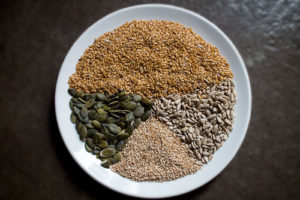 These are all excellent sources of potassium, which can help to regulate your electrolyte balance and keep your blood pressure just right.
These are all excellent sources of potassium, which can help to regulate your electrolyte balance and keep your blood pressure just right.
Pumpkin seeds are also a very good source of zinc, which is an essential mineral for normal brain and nerve development. In fact, the largest deposits of zinc in the body are in the brain areas linked with emotions.
10 – Salmon, mackerel, sardines, trout, herring
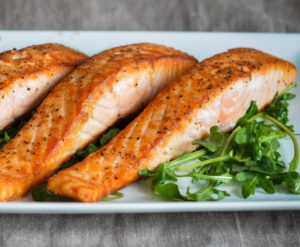 Salmon contains vitamin D and omega-3 fatty acids, nutrients known to be beneficial to brain health.
Salmon contains vitamin D and omega-3 fatty acids, nutrients known to be beneficial to brain health.
Vitamin D has been shown to have positive effects in calming neurotransmitters, and salmon and sardines are among the few foods that contain vitamin D. Vitamin D deficiency is increasingly being shown to be a factor in anxiety and depression.
Omega-3-rich foods, such as fatty fish, that contain alpha-linolenic acid (ALA) provide two essential fatty acids, eicosapentaenoic acid (EPA), and docosahexaenoic acid (DHA). EPA and DHA regulate neurotransmitters, help to reduce inflammation and are thought to promote healthy brain function.
11 – Brazil nuts, cashews, almonds
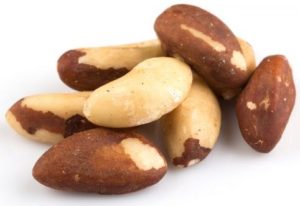 Just a single ounce of almonds (that’s a small handful, maybe a dozen nuts) contains 75 mg magnesium, or 19% of your daily requirement (see above). Brazils are high in selenium (also see above). Selenium can also be sourced from such foods as most other nuts, animal products, vegetables such as soya beans and mushrooms.
Just a single ounce of almonds (that’s a small handful, maybe a dozen nuts) contains 75 mg magnesium, or 19% of your daily requirement (see above). Brazils are high in selenium (also see above). Selenium can also be sourced from such foods as most other nuts, animal products, vegetables such as soya beans and mushrooms.
Brazil nuts are also a good source of vitamin E (an antioxidant), and some studies seem to indicate that low levels of vitamin E may be a cause of depression in some people.
Note: Best not to eat too many Brazil nuts at one time (about 3 or 4 is good); the recommended limit for selenium intake as low as only 400 mcg (micrograms) per day. Be aware that some supplements have quite high doses of selenium.
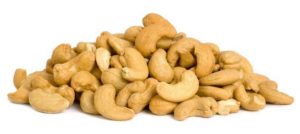 Cashews are quite high in zinc. Zinc deficiency is common in many psychiatric conditions, including depression and anxiety. Studies indicate people with anxiety often have low levels of zinc. Other good sources of zinc include pumpkin seeds, oysters, crab, beef and chicken.
Cashews are quite high in zinc. Zinc deficiency is common in many psychiatric conditions, including depression and anxiety. Studies indicate people with anxiety often have low levels of zinc. Other good sources of zinc include pumpkin seeds, oysters, crab, beef and chicken.
12 – Turmeric
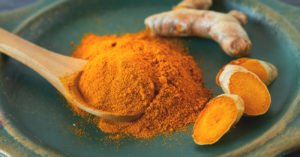 Turmeric is a spice widely used in Asian cooking and contains curcumin, which has been studied for its role in brain health and preventing anxiety. This is partly due to curcumin’s antioxidant and anti-inflammatory qualities that have been shown to protect brain cells from damage.
Turmeric is a spice widely used in Asian cooking and contains curcumin, which has been studied for its role in brain health and preventing anxiety. This is partly due to curcumin’s antioxidant and anti-inflammatory qualities that have been shown to protect brain cells from damage.
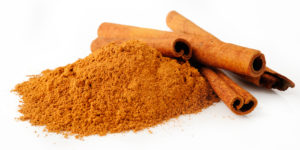
13 – Cinnamon
Cinnamon is also known to have anti-inflammatory properties.
14 – Pineapple
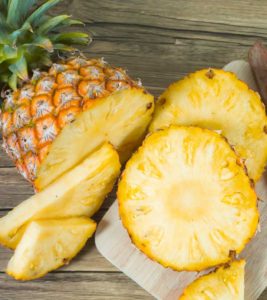 Pineapple is a delicious fruit, high in fibre, and it is thought to improve the mood and help fight anxiety and depression. It’s one of the many great sources of tryptophan, which the body uses to produce serotonin (see above).
Pineapple is a delicious fruit, high in fibre, and it is thought to improve the mood and help fight anxiety and depression. It’s one of the many great sources of tryptophan, which the body uses to produce serotonin (see above).
15 – Turkey
 Turkey is yet another good source of tryptophan, and if you ever wondered why everyone felt tired and very relaxed after a turkey meal … now you know; it’s the calming effect of the tryptophan! And the tryptophan causes the production of serotonin (see above).
Turkey is yet another good source of tryptophan, and if you ever wondered why everyone felt tired and very relaxed after a turkey meal … now you know; it’s the calming effect of the tryptophan! And the tryptophan causes the production of serotonin (see above).
BEWARE THESE FOODS, THE WORST IN TERMS OF CREATING ANXIETY
 The worst foods are those that will cause your nervous system to become unsettled, with the result that you become agitated and anxious. If you’re concerned to avoid the worst of the worst, these are the foods to watch out for:
The worst foods are those that will cause your nervous system to become unsettled, with the result that you become agitated and anxious. If you’re concerned to avoid the worst of the worst, these are the foods to watch out for:
- highly processed foods containing additives, preservatives and colourants
- foods containing long lists of almost unpronounceable chemicals and ingredients
- sugar-laden foods and drinks
- coffee and other drinks containing caffeine
- alcohol
- chillies and curries
All of these will stimulate your nervous system into an agitated state, which is the direct opposite of what you really want. Some of them will give you an initial ‘high’, only to be followed by a dip and quite possibly feelings of anxiety and nervousness. You have been warned!
Note: This isn’t to say you should never eat these foods, just that you should be aware of their effects, specially if you over-indulge.
